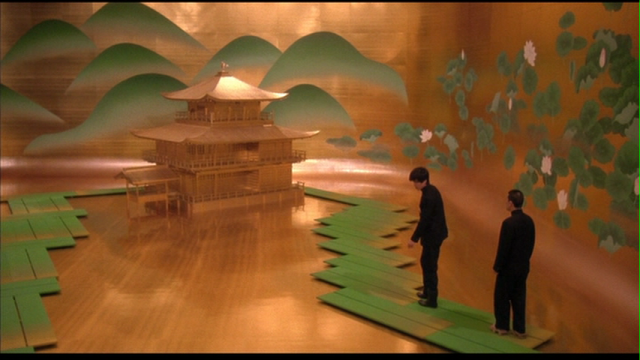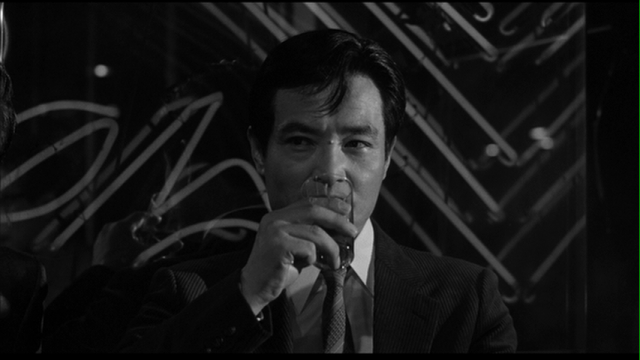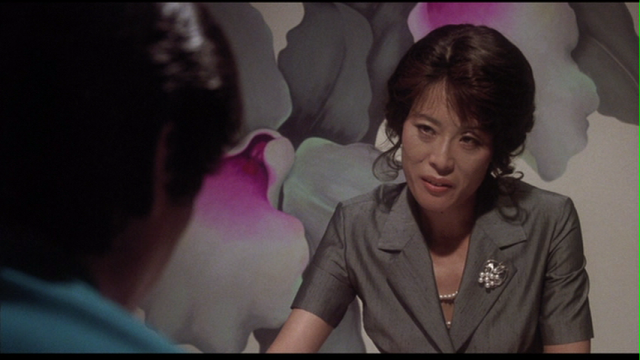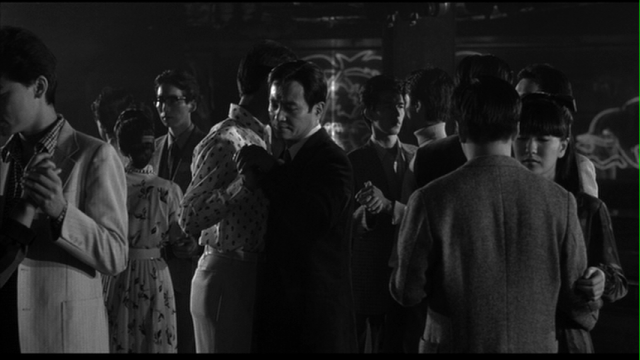|
Genres, Themes, Actors, and Directors:
- Biopics
- Episodic Films
- Japanese Films
- Paul Schrader Films
- Suicide
- Writers
Review:
Paul Schrader’s Mishima remains one of cinema’s most uniquely conceived, visually evocative biopics. By weaving strategically chosen vignettes from several of Mishima’s novels — The Temple of the Golden Pavilion, Kyoko’s House, and Runaway Horses — into the background of his unconventional life, viewers are given an unprecedented glimpse into this warrior-poet’s heady sensibility: we bear witness to his past as a stuttering youth, his ambiguous sexuality, his obsession with bodybuilding, and his determination to die while young and beautiful. What’s most immediately memorable about the film is its stunning palette of vibrant colors, put to work within a series of gorgeous stylized sets used during the “fictional” elements of the film; see the stills below for merely a glimpse of what’s to come. Indeed, the film’s visuals are so captivating that it might be easy to overlook the fine performances by Ken Ogata and others in the supporting cast (most notably Reisen Lee as a butch, domineering lover in “Kyoko’s House”). Meanwhile, Philip Glass’s pulsating score seems like the only logical choice for a film this audaciously original. Time Out‘s reviewer labels Mishima a “breathless plunge into the creative soul”, and this is an apt description: we may not like Mishima-the-author very much, but we can’t help watching his life as portrayed here with fascination.
Redeeming Qualities and Moments:
- John Bailey’s varied cinematographic palette

- Eiko Ishioka’s vibrant set designs

- Ken Ogata as Mishima

- Reisen Lee as Kiyomi

- A unique and spellbinding approach to a biopic

- Philip Glass’s pulsating score
Must See?
Yes, as a one-of-a-kind cinematic treat, and a cult favorite. Listed as a Cult Movie in the back of Peary’s book.
Categories
Links:
|
One thought on “Mishima (1985)”
A definite must – a challenging treat for all ffs, and one of the best films by director Schrader.
Audiences remain rather divided in their assessment of ‘Mishima’. For me, though, the film – which I’ve now seen a number of times – has never not worked.
The first time I saw it, I was living in Tokyo. I don’t know if this is still true but, at the time, ‘Mishima’ was banned in Japan. My local video store, however, had imported a copy of the American video release and it was always on the shelf.
The version I first saw – and the one available thereafter – was split between dialogue scenes with English subtitles and a voice-over narration by Roy Scheider for the rest of the film. The now-available Criterion release has replaced Scheider’s voice with Ogata’s. The film is completely subtitled in English now – which works much better. The prior split tended to keep the viewer at a distance.
Since I was living in Japan at the time of my first viewing, I recognized many of the actors from other films or local tv shows. It was interesting to see many of them have an opportunity to work on something meaty, as opposed to the often-mediocre projects they were otherwise attached to. Aside from ‘Mishima’, many cast members are obviously unknown in America. A fair amount of Ogata’s work is here on DVD (a must-see is 1979’s ‘Vengeance Is Mine’). But most of the good work by an under-rated actor – Toshiyuki Nagashima (the protagonist in the ‘Runaway Horses’ segment in ‘Mishima’) – has not crossed the ocean. (Ozu favorite Ryu Chishu can be seen briefly in the ‘Temple…’ section.)
Of course, one of the main reasons the film was banned in Mishima’s country is the fact that he was gay. It can be argued that he was bisexual, but it doesn’t appear that way to me – and I’m familiar with his novels. Some say the film merely touches on that aspect of the writer’s life – but it is clear as a bell in the film.
Seeing ‘Mishima’ a number of times becomes a matter of layer-peeling. One is first struck by the combined elements that make the film so stunning (most of the artists involved in forming the film are noted in the assessment here but more – noted at IMDb – are responsible for the film’s often-spellbinding effect). Once you get beyond these elements, however – and this struck me as I rewatched last night – you find yourself absorbed by Mishima himself. At times, Ogata lends the man a warmth that seems generous, all things considered – though, I could be speculating. We learn that Mishima’s eventual meltdown grew from his fear (and loathing) that Western influences were causing the ‘purity’ of Japan to disintegrate. That alone is a head-scratcher that seems to reveal the considerable depth of Mishima’s twisted logic.
Does the film romanticize Mishima? I don’t think so. Schrader’s breathtaking yet cold vision seems to appropriately reflect the schism that existed within the celebrated writer.
Two personal faves in this film: the all-too-perfect score by Philip Glass and the thrilling creativity of Eiko Ishioka’s production design.